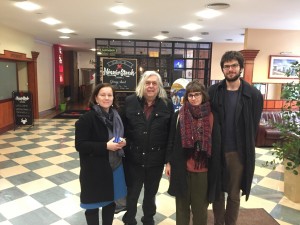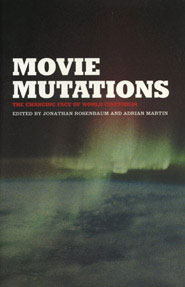This piece had a somewhat tortured history. Commissioned but rejected by Artforum (for reasons that were never explained) circa 1982, it first appeared in a special issue of New Observations (#36, 1983) edited by the late Gilberto Perez, entitled “Horses, Hegel and Film,” where by necessity the illustrations were relatively sparse. In its present form, it first appeared in the 12th issue of the online journal Rouge in 2008. Two excerpts from it are reprinted in a superb recent collection, Manny Farber: Paintings and Writings, that I’m proud to be part of. — J.R.
| 1. Manny Farber, Negative Space (New York: Da Capo, 1998), p. 361. |
|
‘The brutal fact is that they’re exactly the same thing’, Manny Farber replied in 1977 to an interviewer inquiring about the relationship between his dual activities as a painter and film critic. (1) The remark points to a two-part obsession that by now has persisted for more than four decades. A master at perceiving the delicate nuances of brutal facts, Farber has always had an uncanny knack for hitting on truths in a language of wisecracking braggadocio that eliminates any possibility of a dispassionate or precise scientific observation. With his feet firmly planted in the anonymous turf of an underground termite (to conflate two of his favourite terms), Farber paradoxically aims at a notion of bull’s-eye that can exist only in a marketplace context where objects and ideas compete for our attention. |
Read more
Written for the FIPRESCI website in February 2004. For more on the original Shadows, go here.

To the best of my recollection, the first time I ever met Simon Field, the departing artistic director of the Rotterdam International Film Festival, was in the early 1970s — either 1970 or 1973 — when he was programming a festival of experiment filmmaking at the National Film Theatre in London (something he informs me he did both of those years). From the beginning of his eight years at the Rotterdam Festival, a major part of Simon’s special contribution has been not simply an emphasis on experimental film but also a kind of investment in that branch of cinema that perceives and highlights its interconnections with the other arts as well as with other kinds of cinema. There has always been something refreshing about his pluralistic and nonsectarian way of defining film experiment, and one can see this in the range exhibited by Afterimage, the invaluable magazine he coedited in England with Ian Christie for many years — an occasional publication which found room for Raoul Ruiz as well as Michael Snow, Noël Burch as well as Steve Dwoskin, and Jean-Luc Godard as well as Stan Brakhage. Read more
The following interview took place in a hotel lobby in early February 2020. My friend Kinga Keszthelyi, who arranged my visit to Budapest, is on the left, and Simon is on the right. — J.R.

From Movie Mutations to 1968:
An Interview with Jonathan Rosenbaum in Budapest
Simon Petri-Lukács
Jonathan Rosenbaum visited Budapest earlier this year to give a lecture about Abbas Kiarostami and Orson Welles. During this special seminar, he discussed the similarities in the two filmmakers’ relations to self-criticism and the dominating presences of investigations, interrogations and unsolved mysteries in both oeuvres.
I felt great liberation when I discovered Jonathan Rosenbaum’s criticism at the end of my teenage years. The stupidity of critics I was aware of at the beginning of my cinephilia actually led me to the nonsensical conclusion that I had to become a filmmaker to speak about other people’s films in an acceptable and intellectually satisfying way. On my first encounter with Jonathan’s work, I found what I didn’t know I was seeking and it changed my attitude forever. Having said that, it’s quite obvious that I was over the moon to be able to interview him.

I have been interviewing Alexander Horwath for the last two years about several topics and my main interest was to ask Jonathan about his book, Movie Mutations. Read more



